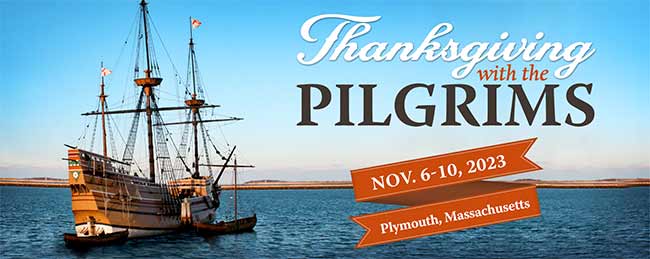
“I know that after my departure fierce wolves will come in among you, not sparing the flock...” —Acts of the Apostles 20:29
The Council of Trent Moved to Bologna,
September 17, 1549
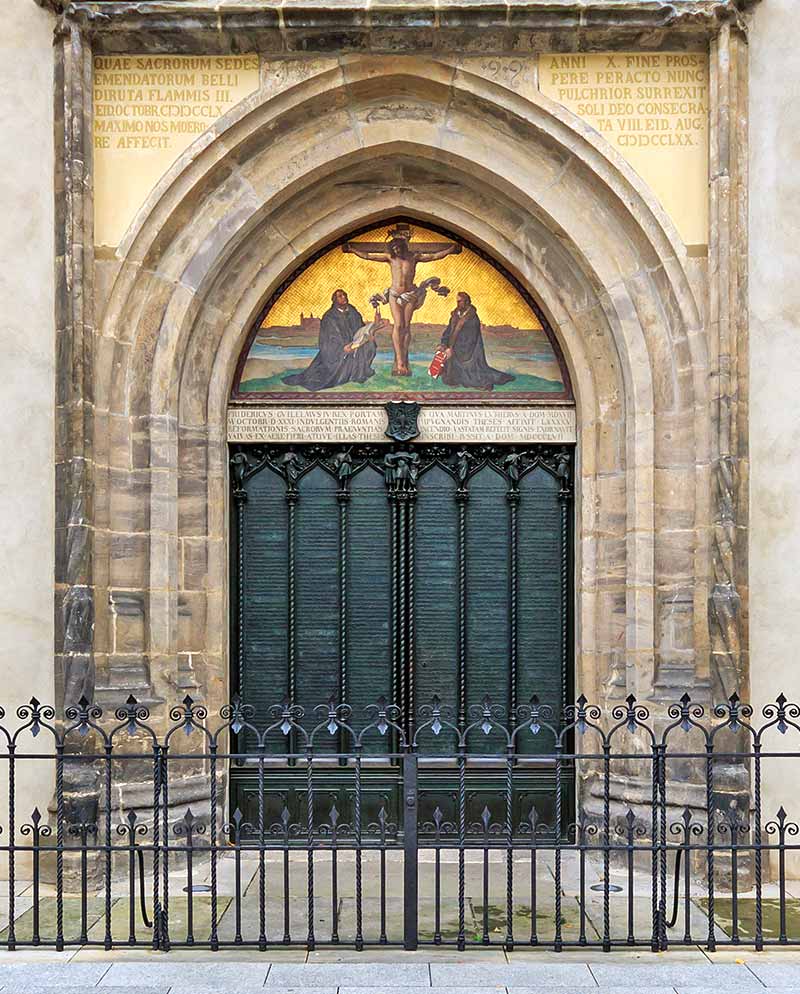
The original doors of All Saints’ Church, Wittenberg—on which Luther nailed his 95 Theses in 1517—were destroyed by fire, so in 1857, King Frederick William IV of Prussia ordered a replacement be made, this time with Luther’s theses engraved into the doors
|
 he German Augustinian friar and theologian Martin Luther, upset over the sale of indulgences, tacked his 95 complaints against the Catholic Church on the door of the church in Wittenberg, Saxony on October 31, 1517. He argued that significant reform was needed in the Church, which placed him in a long line of clerical and academic critics dissatisfied with some of the beliefs and practices of the Medieval Roman Church. While the ecclesiastical and government authorities of the Holy Roman Empire addressed the continuing attacks and challenges of the brilliant German professor, his publications, preaching, and public dissent encouraged many other priests and monks in other German states and several other European countries such as France, Netherlands, England, Switzerland and others, to go public with their dissatisfactions and exposures of moral and theological corruption in the Church. he German Augustinian friar and theologian Martin Luther, upset over the sale of indulgences, tacked his 95 complaints against the Catholic Church on the door of the church in Wittenberg, Saxony on October 31, 1517. He argued that significant reform was needed in the Church, which placed him in a long line of clerical and academic critics dissatisfied with some of the beliefs and practices of the Medieval Roman Church. While the ecclesiastical and government authorities of the Holy Roman Empire addressed the continuing attacks and challenges of the brilliant German professor, his publications, preaching, and public dissent encouraged many other priests and monks in other German states and several other European countries such as France, Netherlands, England, Switzerland and others, to go public with their dissatisfactions and exposures of moral and theological corruption in the Church.
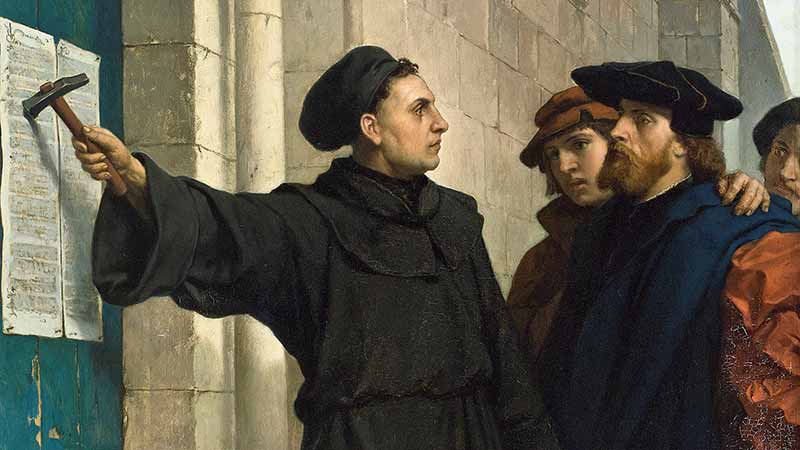
Luther nailing his 95 Theses on the door of All Saints’ Church in Wittenburg, October 31, 1517
Within several years, the protests and desire for reform could not be contained and the “Protestant Reformation” had taken on a life of its own, creating what proved to be irreparable separations from the Roman ecclesiastical system. When parochial solutions failed to stem the tide, the Pope called for a formal ecumenical Council of the Church to address the concerns of the reformers and to codify Catholic doctrine. They met at Trent in northern Italy, a civil jurisdiction ruled by a bishop-prince of the Holy Roman Empire. The results defined what beliefs were anathema and those approved by the Papacy and the Church, and thus spurred on the “counter-reformation.”
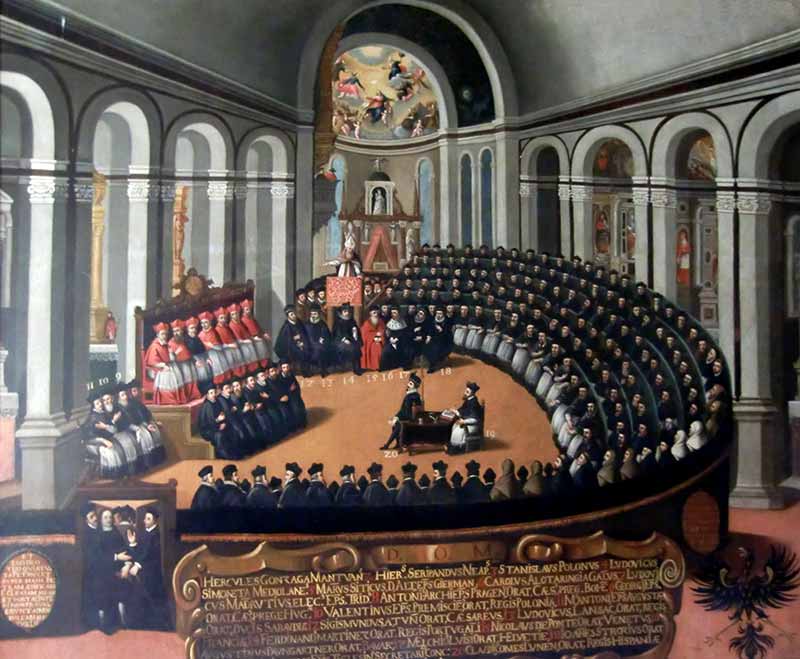
Council of Trent, painting in the Museo del Palazzo del Buonconsiglio, Trent, Italy
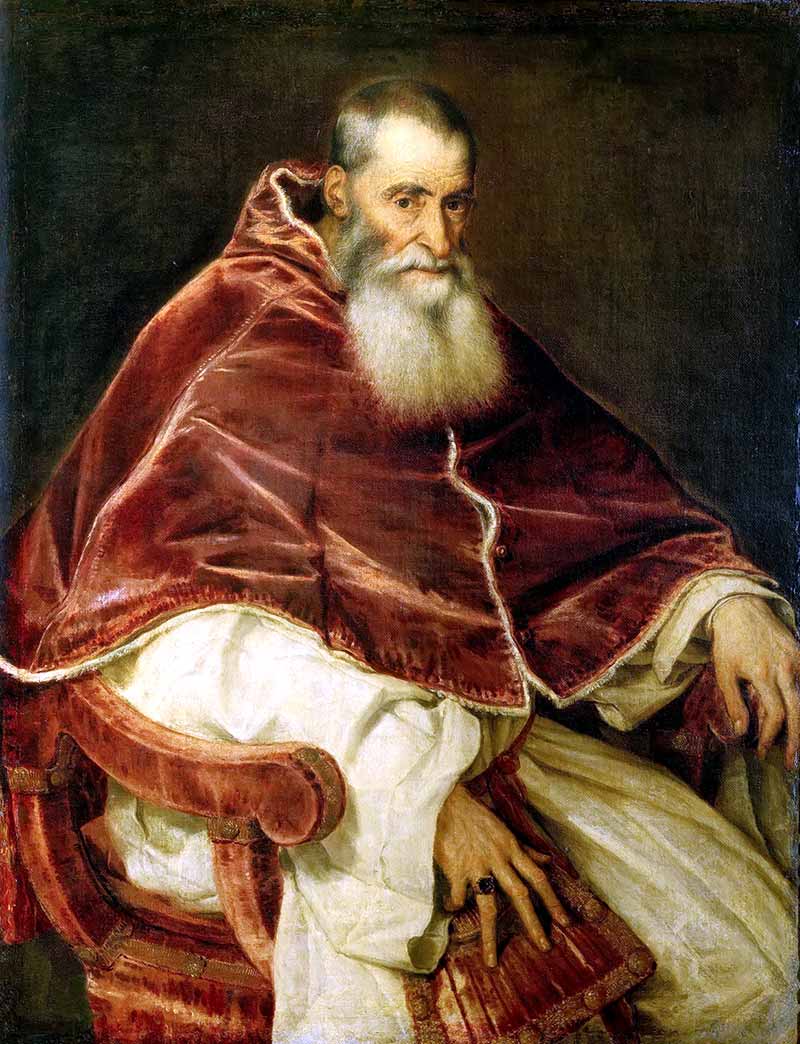
Pope Paul III (1468-1549) served as Pope from 1534-1549, and convened the first meeting of the Council of Trent in 1545 as well as oversaw the first 8 sessions until his death in 1549
|
The Council of Trent lasted on and off from 1545 (the year before Luther’s death) until 1663 (the year after the death of reformer John Calvin). Every prince and every kingdom in Europe were affected by the Protestant Reformation, but many hoped some form of unity could prevail. On September 17, 1549, Pope Paul III tried to move the venue to the Italian City of Bologna, but had to suspend the Council when the powerful Holy Roman Emperor Charles V forbade Spanish and German prelates from attending. The Italian Pope would have possessed more control over the direction of the debates, and the political contentions and wars in the German states at that time were creating havoc in the Empire. Political considerations intertwined with the Council from the start. Emperor Charles V hated France and distrusted the Pope. The “Lutherans” did not want the Pope involved at all. Luther had burned the papal bull issued by Leo X, which threatened excommunication and had declared forty-one of Dr. Luther’s propositions heretical. As it turned out, none of the Popes who reigned during the duration of the Council ever attended, which was a condition of Charles V.
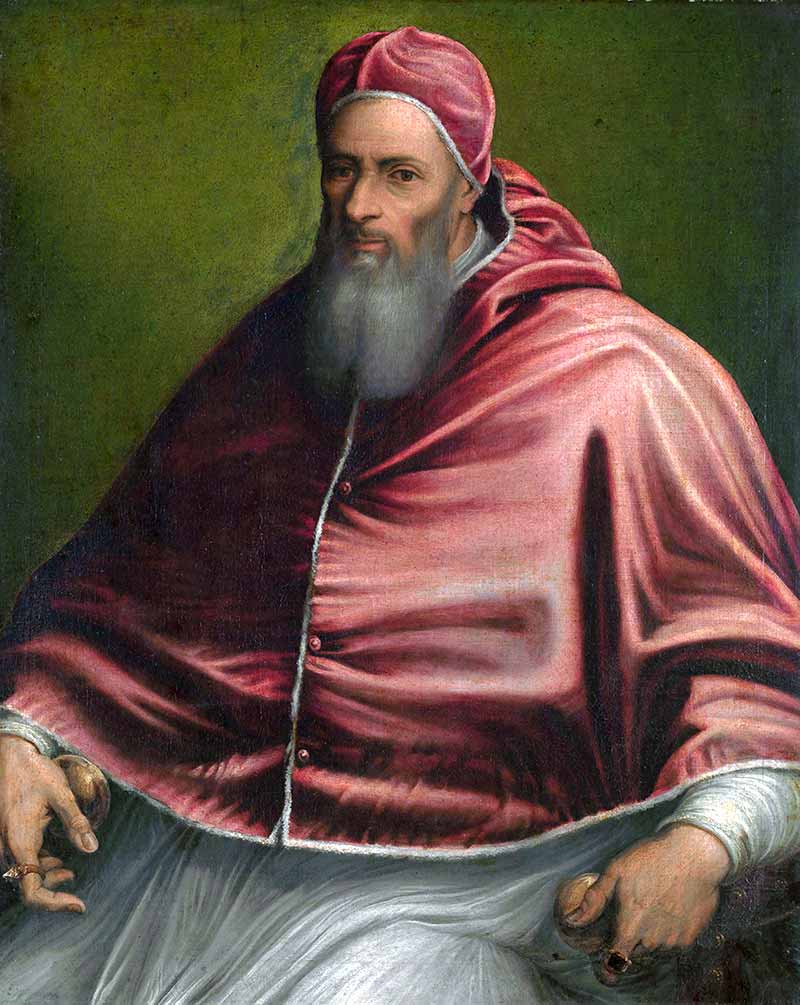
Pope Julius III (1487-1555) oversaw the twelfth to sixteenth sessions (1551–52) of the Council of Trent
|
|
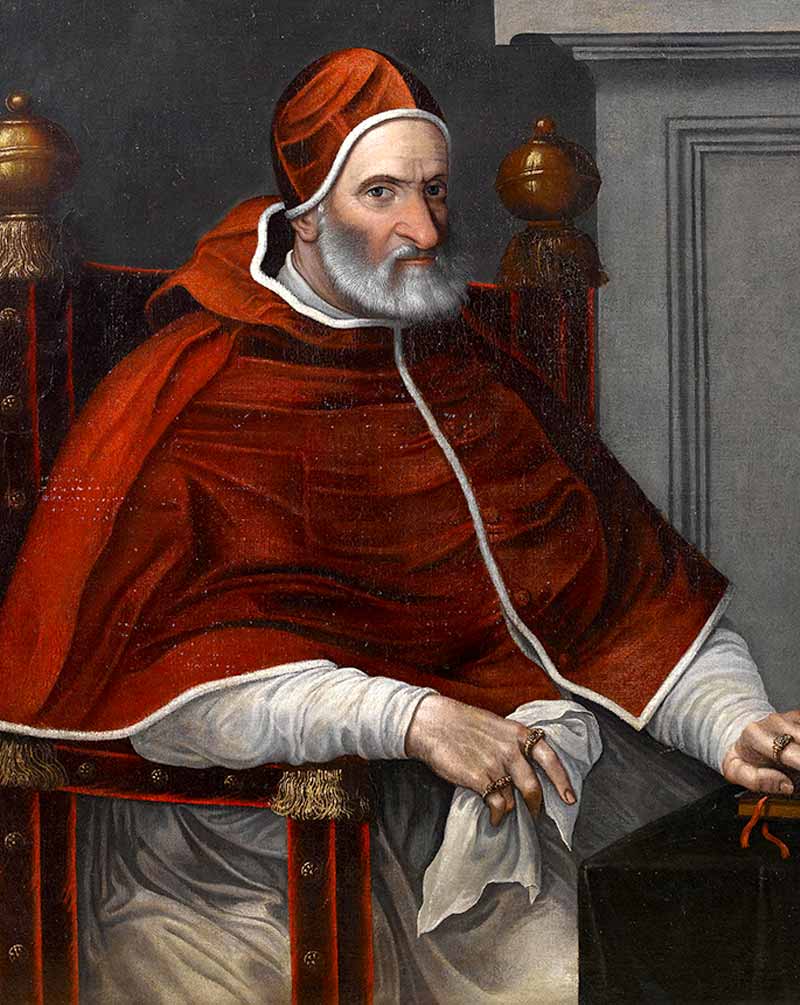
Pope Pius IV (1499-1565) oversaw the seventeenth to twenty-fifth sessions (1562–63) of the Council of Trent
|
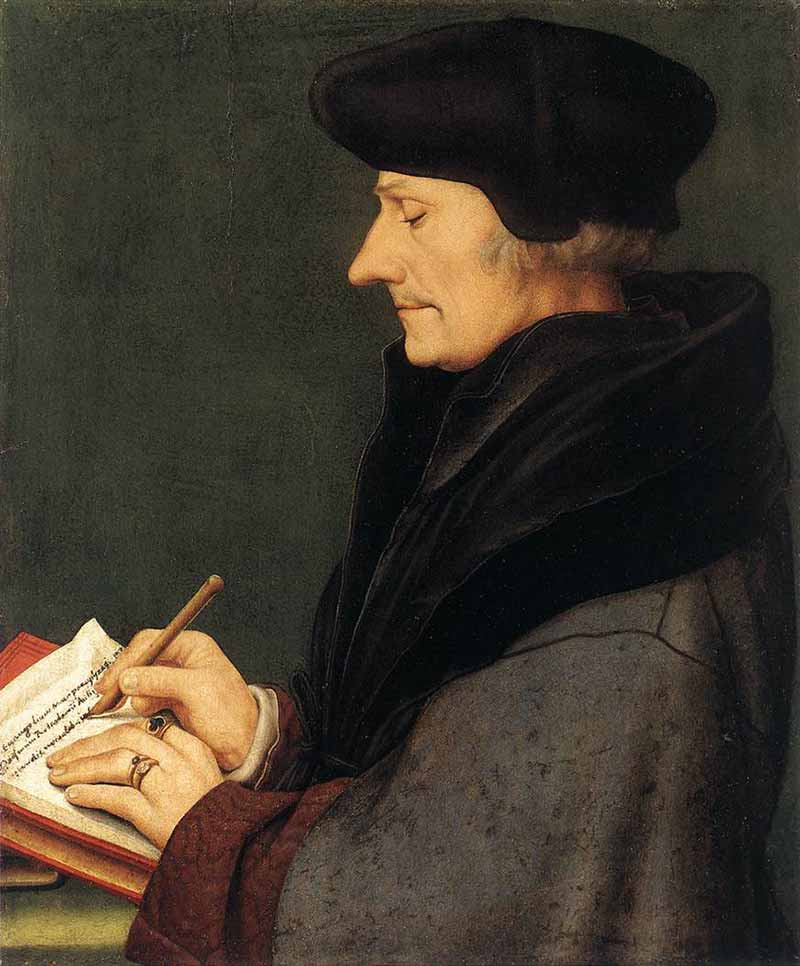
Desiderius Erasmus of Rotterdam (1466-1536) was a Dutch humanist, Catholic theologian, educationalist, satirist and philosopher
|
The convocation reconvened in 1551 for one year. The Protestants were keen to reopen debates over definitions and doctrines already debated, and most decided upon, and called for bishops to be released from their allegiance to the Papacy. No agreements could be made, in particular, over the authority of the Church and the doctrine of justification. Furthermore, Protestants were not given the right to vote which ended any cooperation. Coupled with a military defeat of Charles V in battle, the Church closed the meeting and no Protestant voice would again be heard. The Council could not reopen until 1661, upon the death of the rabidly anti-Protestant Pius IV (Gian Pietro Carafa). In the interim, he had installed the Roman Inquisition, reined in the Jesuits, and forced the Jews to wear distinctive yellow hats, herding them into ghettos. He also issued the first Roman Index of banned books, which included all the works of Erasmus.
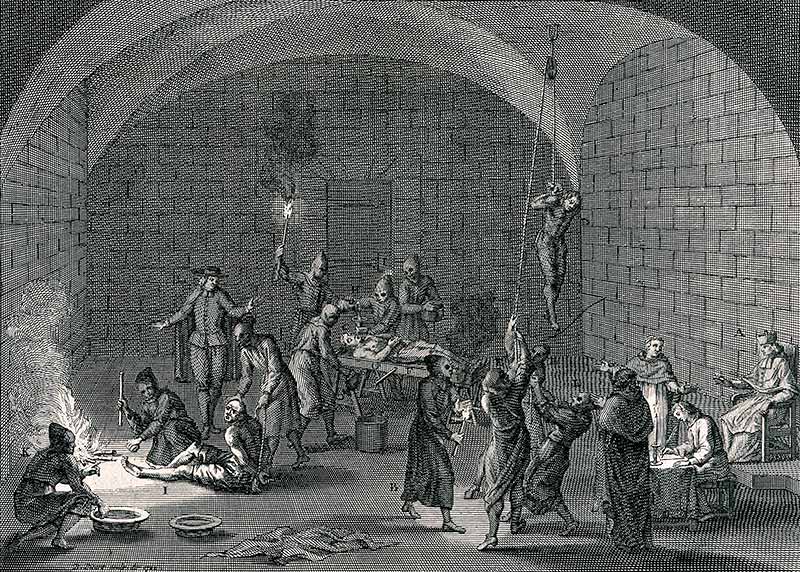
The Spanish Inquisition at work
When the Council convened its last meeting, which lasted about a year, the Jesuits dominated, and a French hope for some conciliation with Protestantism had no possibility of success—Italian bishops overwhelmingly controlled the outcomes. The Council of Trent achieved its twofold goals of condemning the principles and doctrines of Protestantism and clarifying the doctrines of the Catholic Church on all disputed points. The Church officially sought the reform of some of the abuses and issues that triggered the protests in the first place, like the moral corruption of priests and nuns, indulgences and the like. The Council issued decrees which defined Church doctrine on disputed issues and made explicit its condemnation of Protestant beliefs in a litany of curses upon those who held to those beliefs.
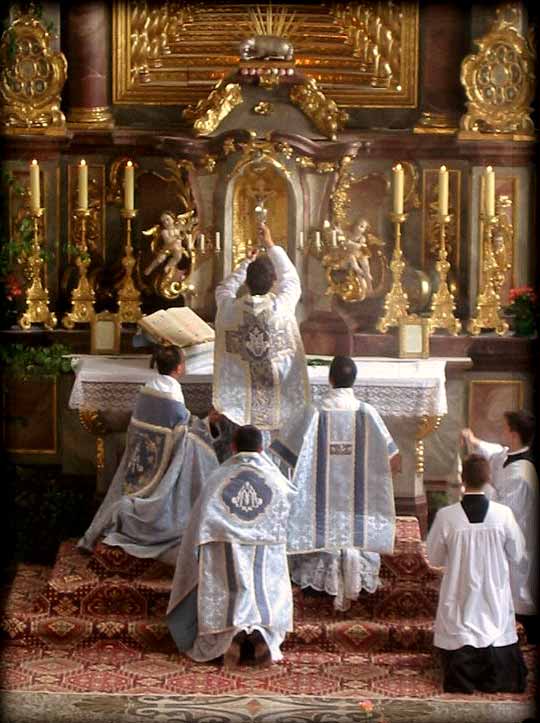
Elevation of the chalice after the consecration during a Tridentine Solemn Mass
The Council affirmed the veneration of the Virgin Mary, church tradition as authoritative as Scripture, reaffirmed seven sacraments of the Church, and, for the first time, used the term transubstantiation as the true meaning of the Mass, and that the sacrifice was to be offered for the living and the dead. They affirmed the Tridentine Mass, which codified Latin as the language of worship and ceremony. A brief summary of a few of the anathemas (curses) of the dozens issued: Let anyone who saith the following be accursed:
Anyone who saith that by Faith alone are the impious justified . . . without man’s cooperation.
Anyone who saith, that the justice received is not preserved and also increased before God through good works; but that the said works are merely the fruits and signs of Justification.
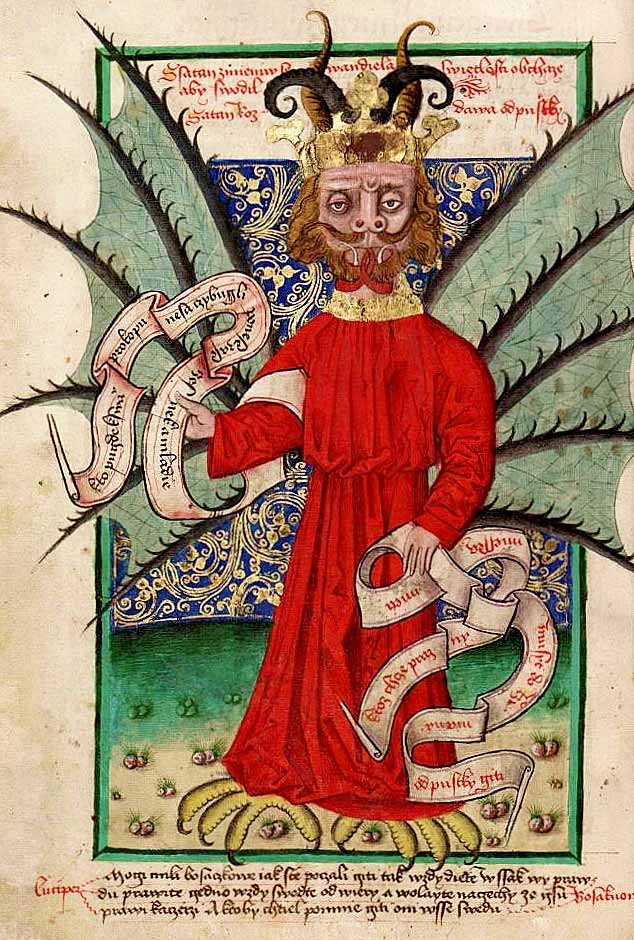
Satan distributing indulgences, an illumination from a Czech manuscript, 1490s; Jan Hus (the main leader of the Bohemian Reformation) had condemned the selling of indulgences in 1412
|
Anyone who saith, that, after the grace of Justification has been received, to every penitent sinner the guilt is remitted, and the debt of eternal punishment is blotted out in such wise, that there remains not any debt of temporal punishment to be discharged either in this world, or in the next in Purgatory, before the entrance to the kingdom of heaven can be opened (to him).
Anyone who saith, that the sacraments of the New Law were not all instituted by Jesus Christ, our Lord; or, that they are more, or less, than seven, to wit, Baptism, Confirmation, the Eucharist, Penance, Extreme Unction, Order, and Matrimony; or even that any one of these seven is not truly and properly a sacrament.
If any one denieth, that, in the sacrament of the most holy Eucharist, are contained truly, really, and substantially, the body and blood together with the soul and divinity of our Lord Jesus Christ, and consequently the whole Christ; but saith that He is only therein as in a sign, or in figure, or virtue.
If any one saith, that it is an imposture to celebrate masses in honor of the saints, and for obtaining their intercession with God, as the Church intends.
The Catechism of the Catholic Church today cites these canons and all the others still in force, and quotes directly from them in teaching the doctrines of the Church. Perhaps those Protestants who want to reunite with the Roman Church ought to take note or check their history and Bibles at the door. The Roman Church still considers you the wolves.
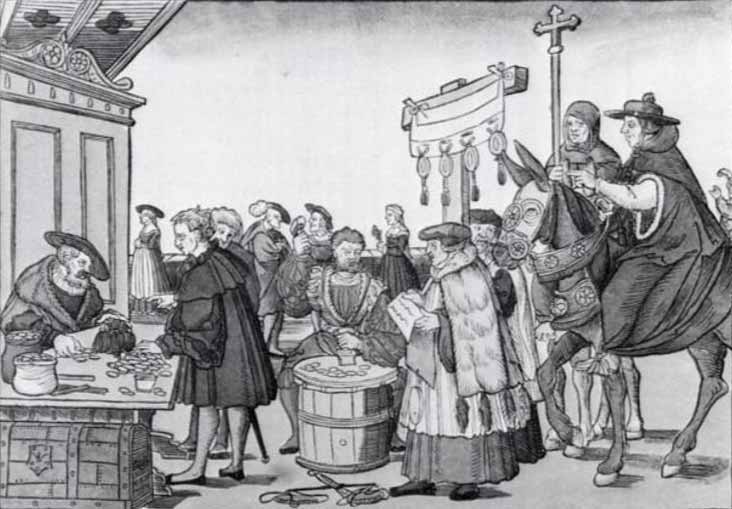
The Catholic church selling Indulgences

Image Credits:
1 All Saints’ Church Doors (wikipedia.org)
2 Luther’ 95 Theses (wikipedia.org)
3 Council of Trent (wikipedia.org)
4 Pope Paul III (wikipedia.org)
5 Pope Julius III (wikipedia.org)
6 Pope Pius IV (wikipedia.org)
7 Erasmus (wikipedia.org)
8 Spanish Inquisition (wikipedia.org)
9 Tridentine Mass (wikipedia.org)
10 Devil selling Indulgences (wikipedia.org)
11 Catholic Church selling Indulgences (wikipedia.org)
|






